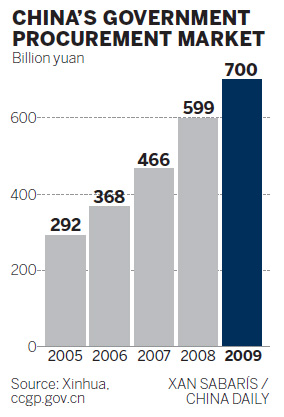Economy
'Don't be too demanding' on GPA offer
By Ding Qingfen, Wu Chong (China Daily)
Updated: 2010-08-06 09:09
 |
Large Medium Small |
Official clarifies China's stance on government procurement pact, saying new proposal will benefit all
BEIJING - The country is committed to joining the government procurement agreement (GPA) of the World Trade Organization (WTO) "as soon as possible", but still hopes GPA member nations including the US are not "too demanding" on its revised GPA offer, said Sun Zhenyu, China's ambassador to the global trade arbitrator.
|
|
The GPA is "quite a new term" for China and it will take "time and effort" for the country to improve its offer over the agreement, Sun said.
If the country joins the agreement, it will also allow Chinese enterprises to enter the government procurement markets in 41 WTO member nations that have joined the GPA. The procurement amount of the US federal and local governments alone was estimated at $3 trillion in 2009, the People's Daily reported.
China entered the WTO in 2001 without joining the GPA. In 2007, it submitted its bid to join the agreement but the US and other WTO members rejected its first proposal.
In mid-July, China submitted a new offer to join the agreement. In the revised offer, the threshold for contracts was lowered and the coverage of both contracts and procurement entities were expanded. The implementation period was also reduced to five years from 15 years as had been indicated in the initial offer, Sun said.
The first round of negotiations with GPA members was held in July and the next meeting is scheduled for October. There will be further in-depth discussion on the revised offer and on the process of China's accession, he added.
US Deputy Trade Representative Demetrios Marantis has praised the revised version, saying that it contained "significant improvement" and was better than the earlier proposal in 2007.
But many have still voiced concerns over the issue. One major concern is that the revised offer does not provide foreign companies access to local government and State-owned enterprise procurement contracts.
A number of GPA member nations have asked China to add more entities into the new offer and further reduce the threshold during the latest negotiations.
Sun said he did not agree with these requirements.
"GPA parties should understand that, under the current offer, a lot of opportunities are provided. And the principle of reciprocity does not necessarily lie in the coverage and threshold, but more importantly, relates to the scale of China's economy and its growth rate," he said.
"China is going through fast economic growth. Numerous contracts will be given out in supplies, services and construction. These will help the world economy to recover from the crisis," Sun said.
Tong Zhiguang, a former vice-minister of commerce and a chief WTO negotiator, also said that the Chinese government has been taking a "positive attitude" in drafting the GPA proposal.
It is unnecessary for China to "go too far" in making compromises on the issue because of the "external pressure", Tong said.
|
||||
But a number of US analysts said that US enterprises and government had "politicized" China's procurement law and indigenous innovation policy.
In response to the US hearing, Elizabeth Lynch, founder of the China Law & Policy blogsite and an expert on China's legal reforms, wrote on her blog that the US Congress "missed the fact that China has actually promised to move forward".
Brett Gerson, an associate with law firm Reed Smith on international relations, told China Daily that the Chinese marketplace presents "tremendous opportunities" even for foreign firms in sectors excluded from the procurement.




